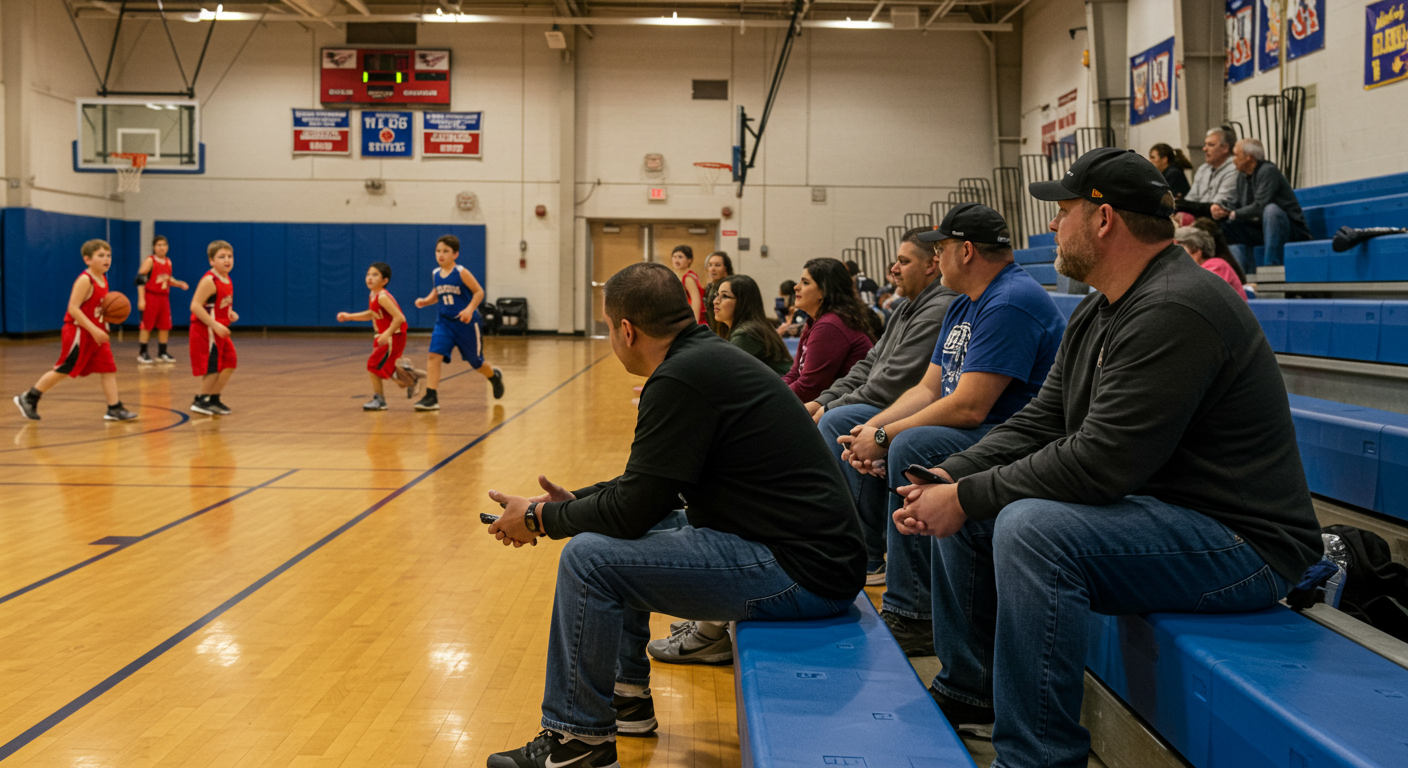Welcome to the Brain & Faith Blog
This is where neuroscience and Scripture meet to bring clarity, calm, and confidence into everyday life. From brain health tips and faith-based practices to practical support for parents of young athletes, you’ll find simple, actionable steps to strengthen your mind, nurture your spirit, and guide your family toward lasting peace and resilience.

The Coaching Parent Dilemma: When to Step Back and Let the Coach Coach
The Sideline Struggle Every Parent Faces
Your child's team is down by one goal with minutes left on the clock. You can see exactly what needs to happen. A simple strategy adjustment that seems obvious from your seat in the stands. Your hands clench as you watch the coach make what appears to be the wrong call.
Every fiber of your being wants to shout instructions, to guide your child toward the winning play. But should you?
This internal struggle represents one of the most challenging aspects of modern sports parenting. Knowing when to step back and trust the coaching process, even when every instinct tells you to intervene. The line between supportive parent and overinvolved sideline coach has become increasingly blurred as youth sports have grown more competitive and parents have become more invested in their children's athletic success.
You're not alone in this struggle. The coaching parent dilemma extends far beyond game-time decisions. It shows up in practice feedback, skill development conversations, team dynamics, and even the life lessons that sports are meant to teach.
Here's what you need to understand: when parents consistently override or contradict coaching decisions, they inadvertently undermine their child's ability to learn independence, resilience, and respect for authority. Yet the desire to help and protect our children is so fundamental that stepping back can feel like abandonment.
What follows will help you navigate these murky waters with clarity and confidence. You'll learn when your involvement enhances your child's experience and when it becomes a hindrance to their growth.
Understanding Your Role vs. The Coach's Role
The foundation of resolving the coaching parent dilemma lies in clearly understanding the distinct roles that coaches and parents play in a child's athletic development.
Coaches are responsible for technical skill development, tactical understanding, team strategy, and creating a competitive environment that challenges athletes to improve. Their expertise lies in understanding the sport's nuances, recognizing talent development patterns, and making decisions that serve the team's collective success while fostering individual growth.
Your role as a parent is completely different. You serve as the primary source of unconditional emotional support, life skill development, and perspective-keeping. Your job is to help your child process their athletic experiences, maintain their self-esteem through inevitable setbacks, and ensure that sports remain a positive force in their overall development.
While coaches may need to be demanding and critical to drive improvement, you provide the safe harbor where your child can express frustration, celebrate achievements, and maintain their sense of worth regardless of performance.
These roles become problematic when they overlap inappropriately. When you attempt to coach from the sidelines, you create confusion for your child who must then navigate conflicting instructions and expectations. Children in this situation often report feeling torn between pleasing their parent and following their coach's guidance. This leads to decreased performance and increased anxiety.
The impact extends beyond individual performance to team dynamics. When one parent consistently challenges coaching decisions or provides alternative instruction, it can undermine team cohesion. It creates an environment where other parents feel pressured to become more involved. This escalation can transform what should be a positive team culture into a political battlefield where children become pawns in adult power struggles.
From your child's perspective, conflicting messages from coaches and parents create cognitive dissonance that interferes with skill acquisition and enjoyment. Young athletes perform best when they can focus entirely on their coach's instruction during practices and games, knowing that their parents will provide emotional support and perspective afterward.
Understanding these boundaries doesn't mean you should become a passive observer. It means recognizing that your most powerful influence occurs away from the field. In the car rides home, during family dinners, and in quiet moments when your child processes their athletic experiences with the person they trust most.
The Clear Signs You're Overstepping
Recognizing when you've crossed the line from supportive parent to problematic sideline coach requires honest self-reflection and attention to both your behavior and your child's responses.
The most obvious sign is sideline coaching during games. Shouting instructions, correcting technique, or providing tactical advice while your child is trying to focus on their coach's guidance. Even well-intentioned encouragement can become problematic when it includes specific technical or strategic direction.
Pay attention to your language during and after games. If you find yourself frequently discussing what your child "should have done" or offering technical corrections that contradict coaching instruction, you may be overstepping. Comments like "You should have passed instead of shot" or "Your coach was wrong to put you in that position" undermine both the coaching relationship and your child's ability to learn from their experiences.
Another red flag is when you regularly initiate conversations with coaches about playing time, position assignments, or team strategy. While occasional communication is appropriate, frequent attempts to influence coaching decisions suggest that you're struggling to maintain appropriate boundaries.
If you find yourself researching opposing teams, developing game plans, or providing detailed technical analysis to your child, you may be taking on responsibilities that belong to the coaching staff.
Your child's reactions provide the clearest indicator of whether your involvement has become problematic. Children who seem embarrassed by your sideline behavior, who ask you to "please just watch," or who appear tense when you're present at games are sending clear signals. Your involvement is causing stress rather than providing support.
Some children may become overly dependent on parental guidance, constantly looking to the stands for approval or instruction instead of focusing on their coach and teammates.
Physical signs can also indicate overinvolvement. If you find yourself pacing during games, experiencing high levels of anxiety about your child's performance, or feeling personally invested in team outcomes, these emotional responses suggest that you may be too enmeshed in your child's athletic experience.
The ultimate test is whether your involvement enhances or detracts from your child's independence and confidence. If your child seems unable to make decisions without your input, struggles to communicate directly with coaches, or appears to lose confidence when you're not present, these may be signs that your well-intentioned support has become counterproductive dependence.
When and How to Step Back Effectively
Learning to step back effectively requires both timing awareness and alternative strategies for channeling your supportive energy.
During games, your primary role should be that of an encouraging spectator who celebrates effort and sportsmanship rather than providing technical feedback. This means cheering for good plays, supporting teammates, and maintaining positive energy regardless of the score or your child's individual performance.
The transition from active involvement to supportive observation can be challenging, especially if you have athletic experience or strong opinions about strategy. Develop alternative behaviors that keep you engaged without overstepping. Take photos, keep statistics, or focus on observing your child's effort and attitude rather than their technical execution.
Some parents find it helpful to sit with other families who model appropriate sideline behavior, creating positive peer influence for your own conduct.
During practices, resist the urge to provide immediate feedback or corrections. Allow your child to receive instruction from their coach, make mistakes, and learn through repetition without parental commentary. If you attend practices, position yourself where you can observe without being a distraction. Save any questions or concerns for appropriate private conversations with coaching staff.
The post-game car ride home represents a crucial opportunity to demonstrate appropriate boundaries. Instead of immediately launching into performance analysis, give your child space to decompress and process their own experience. Ask open-ended questions like "How did that feel?" or "What did you think about the game?" rather than providing your own assessment.
If your child wants to discuss specific plays or decisions, listen actively and help them think through their experiences rather than providing definitive answers.
At home, focus on emotional support and life skill development rather than technical coaching. Help your child develop problem-solving skills by asking questions that encourage self-reflection. "What do you think you could work on in practice this week?" or "How do you think you could communicate better with your teammates?" This approach builds independence while still providing valuable parental guidance.
When concerns about coaching decisions or team dynamics arise, address them through appropriate channels rather than undermining the coach's authority. Schedule private conversations with coaching staff to discuss your observations or concerns. Approach these discussions as collaborative problem-solving rather than confrontational complaints.
Remember that coaches often have information and perspectives that aren't visible from the stands.
Teaching your child to self-advocate represents one of the most valuable skills you can develop during this stepping-back process. Encourage your child to ask questions, seek clarification, and communicate directly with coaches about their goals and concerns. Role-play difficult conversations at home, but resist the urge to have these conversations for your child.
How to Stay Involved Appropriately
Stepping back doesn't mean stepping away entirely. There are numerous ways to remain positively involved in your child's athletic experience while respecting coaching boundaries.
Emotional support represents your most important contribution to your child's athletic journey. Be the consistent source of encouragement and perspective that helps your child navigate the inevitable ups and downs of competitive sports. Celebrate effort over outcome, acknowledge improvement over perfection, and help your child maintain a healthy relationship with both success and failure.
This emotional foundation allows children to take the risks necessary for growth and improvement.
Practical support enhances your child's athletic experience without interfering with coaching decisions. Ensure proper nutrition, adequate sleep, and appropriate equipment. Help with transportation, volunteer for team activities, and support fundraising efforts. These contributions demonstrate your commitment to the team while staying within appropriate boundaries.
Communication with coaches should focus on your child's overall well-being rather than tactical or strategic concerns. Share relevant information about injuries, family circumstances that might affect performance, or academic pressures that could impact your child's availability.
Ask about your child's development goals and how you can support their progress at home. These conversations should be collaborative and focused on your child's long-term growth rather than short-term performance outcomes.
Building positive team culture represents another appropriate area for parental involvement. Support all team members, not just your own child. Volunteer for team events, organize social activities that build camaraderie, and model good sportsmanship in your interactions with other families. When parents work together to create a positive environment, it benefits all children on the team.
Help your child develop life skills that enhance their athletic experience. Time management, goal setting, conflict resolution, and communication skills all contribute to athletic success while serving your child throughout their life. These conversations happen naturally at home and don't interfere with coaching responsibilities.
Maintain perspective on your child's athletic experience within the context of their overall development. Help them balance sports with academics, friendships, and other interests. Ensure that athletics remain a positive force in their life rather than an all-consuming pressure.
This perspective-keeping is uniquely a parental responsibility and one of your most valuable contributions to your child's well-being.
The Deeper Purpose Behind Stepping Back
Sometimes the most loving thing you can do is trust the process, even when it's difficult to watch. There's wisdom in allowing your child to navigate challenges with their coach's guidance rather than your intervention.
When we step back appropriately, we're teaching our children that growth often comes through learning to work with different authority figures, handling constructive criticism, and developing their own problem-solving skills. These are life skills that extend far beyond the playing field.
Your child is learning to respect authority while maintaining their own voice, to persevere through challenges without parental rescue, and to find intrinsic motivation for improvement. These lessons shape character in ways that go far beyond athletic achievement.
Consider that your child's coach may be placed in their life for reasons beyond just sports instruction. Sometimes the lessons learned through navigating a challenging coaching relationship, learning to communicate respectfully with authority figures, or developing resilience through sports difficulties are exactly what your child needs for their overall development.
The Long-Term Benefits of Appropriate Boundaries
The benefits of appropriate boundaries extend far beyond sports performance. Children who learn to navigate coaching relationships, handle constructive criticism, and solve problems independently develop resilience and confidence that serves them throughout their lives.
They learn to respect authority while maintaining their own voice, to persevere through challenges without parental rescue, and to find intrinsic motivation for improvement.
Your child's athletic journey is ultimately theirs to experience, with all the triumphs, setbacks, and learning opportunities that entails. By stepping back from the coaching role and stepping up as a supportive parent, you give your child the greatest gift possible: the freedom to grow, learn, and discover their own capabilities.
The memories they'll treasure most won't be of perfect performances or championship victories, but of knowing that their parent believed in them unconditionally and trusted them to navigate their own path to success.
When you model appropriate boundaries, calm confidence, and trust in the process, you're teaching your child how to handle authority, work through conflict, and develop independence. These are gifts that will serve them long after their athletic career ends.
Your role as a sports parent is ultimately about raising a child who can handle life's challenges with grace, resilience, and confidence. Sometimes that means cheering from the stands and trusting that the lessons being learned through sports are exactly what your child needs for their journey ahead.
Struggling to find balance between supporting your child and letting the coach coach? You're not alone. Schedule a free 30-minute consult where we'll talk through your specific challenges and create a plan to help you support your athlete in a way that builds confidence, resilience, and joy in sports.
Brain Health Matters, LLC
Helping busy minds find peace through faith and neuroscience.
© 2025 Brain Health Matters, LLC. All rights reserved.
Terms & Conditions

